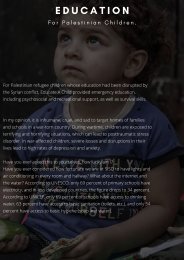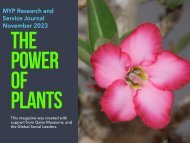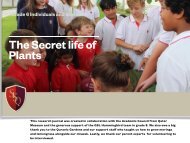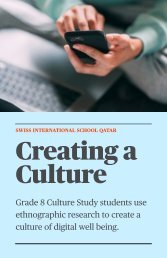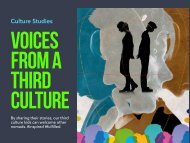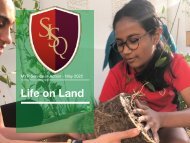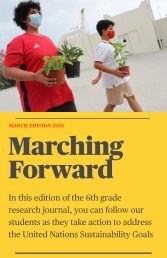You also want an ePaper? Increase the reach of your titles
YUMPU automatically turns print PDFs into web optimized ePapers that Google loves.
MARCH EDITION 2021<br />
<strong>Marching</strong><br />
<strong>Forward</strong><br />
In this edition of the 6th grade<br />
research journal, you can follow our<br />
students as they take action to address<br />
the United Nations Sustainability Goals
Partnering for the Goals<br />
BY 6TH GRADE ........................................................... 5<br />
<strong>Marching</strong> <strong>Forward</strong><br />
...................................................... 6<br />
AL SAFWA FARMS JOINS THE HUMMINGBIRDS 10<br />
FUME BUSTERS (WHO YOU GONNA CALL?) BY<br />
GRACE A, GRACE M, OLIVER M AND SHREEDHAR.<br />
14<br />
WRIGGLY WONDERS BY METE, BRIEUC, ETHAN<br />
AND MATHIAS .......................................................... 18<br />
EARTHWORMS: WHAT ARE THESE TINY WIGGLY<br />
CREATURES? BY SIMRA ........................................... 25
FOOD SUSTAINABILITY IN QATAR BY TAREQ ..... 35<br />
Hummingbird Heroes .............................................. 42<br />
In our next editions: ................................................. 43
Would you like to know more about why this team of<br />
hummingbirds looks so proud? Or maybe you would like to<br />
know why we are all holding plants? <br />
If you have been following our research in our previous<br />
journals then you know that our students have been<br />
inspired to protect pollinators and make ethical choices.<br />
Little did we know that we were about to make some new<br />
allies who would help us to do our part in achieving<br />
Qatar’s vision for 2030 and the United Nations sustainable<br />
development goals...
<strong>Marching</strong> <strong>Forward</strong><br />
By 6th grade <br />
The National Vision of Qatar outlines environmental<br />
development as one of pillars of sustainable growth for Qatar.<br />
In this issue, we will explore the importance of food security<br />
for Qatar as well as how our students are collaborating with<br />
local organisations to become a living part of this exciting<br />
initiative.
<strong>Marching</strong> <strong>Forward</strong><br />
The mission statement for Swiss International School<br />
proudly declares that our students are “inspired”,<br />
“challenged” and “prepared”<br />
The hours of hard work and research that has gone into<br />
Service in Action this month proves that our MYP students<br />
are not only inspired to learn outside of the classroom but<br />
also prepared to do their part in leaving a legacy for future<br />
generations - even though they are still children themselves!<br />
“The pandemic is a portal”<br />
On the 22nd February, we were invited to present our<br />
research to schools from across Qatar and even a school in<br />
Dubai at The Portal Conference hosted by the American<br />
School of Doha.<br />
The idea of The Portal was inspired by a poem about<br />
Covid called “The Pandemic is a Portal” by Arundhati Roy.<br />
Roy reminds us that the virus provides a wake up call to<br />
examine our priorities. This beautiful quote summarises it<br />
beautifully:<br />
“We are collectively faced with a need for deep<br />
feeling, solidarity, and action”
At The Portal Convention, we were inspired by Carl<br />
Wilkens, author of “I’m Not Leaving”. Carl was the only<br />
American who stayed during the Rwandan genocide<br />
because he realised that, once the adults were murdered,<br />
there would be lots of vulnerable children and he couldn’t<br />
leave them to die.<br />
Our students listened in fascination as Carl reminded us<br />
that there is hope and light in even the darkest situations<br />
and we need to believe in our collective power to make a<br />
difference.<br />
But that was just the beginning!
5 groups of MYP<br />
students<br />
presented their<br />
service in action<br />
research and we<br />
got to listen to<br />
other students<br />
who were doing<br />
what Carl<br />
Wilkens had<br />
been describing: bringing hope and light to the dark<br />
situation caused by Covid.<br />
<br />
<br />
Not only can we reach out and partner with other young<br />
people in Doha so that we can share our skills and<br />
experience, but we have also been asked to share our
presentations with Eco-Schools Qatar so that they can<br />
publish our learning throughout Doha.<br />
All of this happened because our students were willing to<br />
put in extra time and energy to create their presentations.<br />
They were challenged to speak in front of total strangers<br />
and inspired to continue learning more once the<br />
conference was over.<br />
We are naturally incredibly proud of them.<br />
On behalf of all the GSL teams, we would like to thank the<br />
following people who made this event possible for us:<br />
Marcia Jones, Chi-Yan Shang and Mary May from The<br />
American School of Doha for<br />
organising the event.<br />
Lou Gillard and Lewis<br />
Macdonald for supervising<br />
and supporting students with<br />
their speeches.<br />
Ruba Benini for the much<br />
appreciated snacks.<br />
Look at the difference<br />
between healthy soil and<br />
barren sand.
Al Safwa Farms Joins The Hummingbirds<br />
Could you imagine trying to farm in Qatar? Now<br />
imagine trying to provide enough food for the nation<br />
with only 100 mms of water per annum.<br />
A number of our 6th graders were fascinated by this<br />
topic. Tareq researched how important food security was<br />
in the blockade, Mohammed Ali wrote about farms like<br />
Baladna but our students weren’t really aware of any farms<br />
that were proudly ethical and organic.<br />
Perhaps, this simply wasn’t possible here?
Despite the harsh<br />
farming conditions<br />
in Qatar, there are<br />
1300 farms who<br />
manage to survive<br />
on desalinated<br />
water and Al Safwa<br />
products come<br />
from a farm that<br />
has been operating<br />
since 1975.<br />
What makes the<br />
farm so interesting<br />
and fascinating is<br />
that their food<br />
production<br />
techniques are<br />
ethical and sustainable. Wahat Al Shafalahia was<br />
established in 1975 as the Al Fardan family farm and today<br />
they are actively inspired to provide the healthiest foods to<br />
the Qatari people in line with the 2030 Vision for Qatar.<br />
That means no pesticides, no dangerous chemicals and<br />
ethical treatment for all animals. Al Safwa products are<br />
100% organic. And in order to preserve precious resources,<br />
many Al Safwa products are produced using hydroponics<br />
which prevents up to 80% of water loss.<br />
You can imagine our delight when Al Safwa contacted<br />
us and invited us to share our research with them.
Not only, did they listen to<br />
our dreams for a<br />
biodiversity garden, they<br />
taught us how to mix the<br />
soil, peat moss and coco<br />
substrate ( a very important<br />
skill for carbon capture) and<br />
they donated the most<br />
amazing organic plants.<br />
Have a look at how<br />
their soil expertise<br />
have helped our<br />
students to make the<br />
desert bloom:
Thanks to the generous support of Mr<br />
Fardan Al Fardan, our students have<br />
realised their dream of having a<br />
sustainable biodiversity garden and<br />
they will also be learning<br />
hydroponics.<br />
In exchange, the students will<br />
continue sharing their research with<br />
their new partner and we hope that<br />
our friends in Al Safwa enjoy our<br />
research in this edition.
Fume Busters (Who you gonna call?) by<br />
Grace A, Grace M, Oliver M and Shreedhar.<br />
The Fume Busters are a group that have entered the<br />
Global Social Leaders to address the issue of carbon<br />
pollution in Qatar.<br />
In class, we learned how Qatari life expectancy has<br />
increased enormously since 1945 due to massive economic<br />
progress. Qatar now has amazing hospitals and airports but<br />
all this development has come at a price.<br />
The air pollution is alarming and due to get a lot worse<br />
due to all the construction for the World Cup. To make<br />
matters worse, the population is drastically increasing and<br />
this means that there is an increase in energy needs and<br />
more carbon emission.
Zoom has become really useful in the past year, although<br />
a recent study has shown that just 1 hour of high definition<br />
Zoom produces the equivalent CO2 of driving 26 km. To<br />
put this into perspective: from Qatar Mall to Festival City is<br />
25.9km. On top of this, high definition zoom calls produce<br />
2.8kg per hour over 250 days.From this data I have found<br />
out that a school of 500 children would produce 700 kg of<br />
carbon per year if they met for only an hour a day. If they<br />
were online for the entire day, they would produce 3500kg<br />
of carbon. To put into perspective, a BMW I3 weighs 1,195kg<br />
meaning for every year a small school is producing 2<br />
BMW’s.<br />
Meanwhile, a tree only consumes 10kg of carbon a year.<br />
We think that the answer lies in carbon capture<br />
gardening. Could the soil of our school capture the carbon<br />
that we are producing?
What is a carbon capture garden? Well a carbon capture<br />
garden is a garden with a bunch of plants that breath in the<br />
CO2 as well as being places for recreation and wildlife.The<br />
best thing about carbon gardens are that they absorb CO2<br />
and that is good because today we use a lot of factories for<br />
toys and other products we don’t necessarily need.The CO2<br />
gardens clean the air around us.<br />
We need CO2 gardens because CO2 is a greenhouse gas<br />
and greenhouse gasses are very bad for the environment<br />
and for our health.CO2 gardens won’t just solve the<br />
problem on their own - we will need a better plan but the<br />
CO2 gardens are a great way to help clean the air.<br />
We really need CO2 gardens because of all the things we<br />
do to the air and to the atmosphere.CO2 can pollute the air<br />
and CO2 is very poisonous so if there is a lot in the air then<br />
we could potentially damage our mental health and<br />
possibly our physical health. <br />
When Al Safwa donated soil, coco substrate and peat<br />
moss, we discovered that the soil itself could capture<br />
carbon and we are now actively pursuing composting<br />
and permaculture as a way to increase our carbon<br />
capture. A big thank you to Mrs Farhana Raquib for<br />
helping us with the composting.<br />
Another way that we can address our carbon<br />
consumption is by examining our tissue use. Due to Covid,<br />
we now use tissues to disinfect our learning areas. We<br />
cannot recycle these tissues.
If we were to estimate how many tissues one person uses<br />
for a lesson it will be 4-6 due to cleaning the tables before<br />
and after, if we estimate how many tissues one child is<br />
using in grade 6 they are using 40 tissues a day. Every week<br />
will be 280 tissues which if we estimated there were around<br />
54 pupils in our grade 2160 tissues are being used and that<br />
is just in grade 6 and 15,120 tissues a week but including the<br />
fact ⅕ of our grade are online everyday from Sunday to<br />
Thursday.<br />
You may ask how is this increasing our carbon footprint?<br />
It’s increasing our carbon footprint by cutting down more<br />
trees and these tissues we can’t reuse because of covid<br />
guidelines and being wet from disinfectant.<br />
We have a number of responsible students who have<br />
volunteers to bring cloths to school that they can wash<br />
daily and we are working on a plan with Mrs Olivier to do<br />
this safely and responsibly so this is another small way to<br />
minimize our carbon footprint.<br />
https://daily.jstor.org/five-steps-to-making-your-garden-acarbon-sink/<br />
#:~:text=Gardens%20can%20be%20very%20efficient,it%20i<br />
n%20soils%20and%20plants.&text=of%20Concerned%20Sc<br />
ientists.-,The%20key%20to%20locking%20up%20carbon%2<br />
0is%20soil%2%80%94and%20there,making%20that%20soi<br />
l%20store%20carbon. <br />
https://gerrymcgovern.com/the-hidden-pollution-cost-ofonline-meetings/
Wriggly Wonders by Mete, Brieuc, Ethan<br />
and Mathias<br />
Worms are another amazing way to reduce our carbon<br />
footprint as they can trap carbon in the soil. Part of the<br />
Fume Busters team has focused on how we can use<br />
vermiculture and composting to support the<br />
hummingbirds and capture our carbon.<br />
Worms are animals that are normally quite long, they are<br />
shaped in cylindrical tube form it as no limbs, no legs, no<br />
arms and no eyes. As you can see in the photo there worms<br />
have loads of organs (brain, heart, anus, etc…).<br />
They also have ventral nerve cords and they have really<br />
small hairs used for protection and for locomotion. They<br />
also have a very important part of the body and that is<br />
called a clitellum. The clitellum is a big layer of skin and
usually it has a light pigment. This is where the eggs are<br />
kept.<br />
How can worms be helpful?<br />
Worms can be helpful because when they eat they leave<br />
behind castings that are really good for fertilizing<br />
soil.Worms help the water in the soil flow nicely to the roots<br />
of plants and worms help the increase of air that gets into<br />
the soil.The worms bring down organic matter from the top<br />
into the soil and they mix it around with the soil below.<br />
Helpful worms <br />
Are worms harmful? <br />
<br />
Worms can look disgusting and harmful. You might think<br />
they are going to do something bad to you but worms are<br />
pretty calm and unharmful. They help the environment;<br />
for example by their activity in the soil, earthworms offer
many benefits: increased nutrient availability, better<br />
drainage, and a more stable soil structure, all of which help<br />
improve farm productivity.<br />
This is how Mete built our worm farm:<br />
First, I started by poking holes in the box I was using for my<br />
worm farm. I poked the holes so the extra water will drain<br />
out and can be used for other soil. <br />
Having the holes is important because if the worms get too<br />
much water they will suffocate. <br />
I shredded paper into little pieces to use in my worm farm.<br />
The newspapers were too colorful to use because of the<br />
chemicals that could harm the worms.<br />
Next, I put the paper at the very bottom of the box. I put a<br />
bit of water on the paper.
We put the box on top of a lid<br />
so the extra water would drain out and be collected. <br />
Then, I put a layer of soil over the paper. I put a bit of<br />
water on the soil.
Then, I used left over food and coffee grinds and added<br />
them to the soil. <br />
This will be good for the<br />
worms to eat and<br />
compost. <br />
I repeated these steps a<br />
couple times and then<br />
closed the box.<br />
I read to leave this for a<br />
week before adding the<br />
worms.<br />
<br />
When I have the worms I<br />
will cover the box to make<br />
it dark. <br />
Finally, I added the worms. can you see them?
Mete did a wonderful job of caring for our worms. He made<br />
sure the soil was moist (they breathe through their skin)<br />
and he kept their wormery dark. We had a few dead worms<br />
but most survived and we managed the flies with a<br />
newspaper lid. We had no mould or stenches.<br />
The worms will now go to live with the early years students<br />
who will take very good care of them.<br />
A big thank you to Dr Madge for reminding us that worms<br />
are an invasive species in Qatar. Although we found no<br />
research to indicate that they are harmful, we are not<br />
prepared to take the risk of releasing them into our garden.<br />
They will be very happy in their wormery.<br />
References<br />
https://en.wikipedia.org/wiki/Worm<br />
https://en.wikipedia.org/wiki/Clitellum<br />
https://web.extension.illinois.edu/worms/live/<br />
#:~:text=Worms%20help%20to%20increase%20the,are%20<br />
like%20free%20farm%20help.
https://www.bing.com/videos/search?<br />
view=detail&mid=F6E3EFAC64EEF4A1AE93F6E3EFAC64E<br />
EF4A1AE93&q=worm+farm+for+kids&shtp=GetUrl&shid=d<br />
dceba0d-5598-44ce-8f9cdaf967127018&shtk=SG93IHRvIG1ha2UgYSB3b3JtIGZhcm0<br />
gd2l0aCB5b3VyIGtpZHM%3D&shdk=SGllZmVyIFZpbGxhZ2<br />
UgdGFsa2VkIGFib3V0IGFjdGl2aXRpZXMgYW5kIHdvcmtz<br />
aG9wcyBmb3Iga2lkcyBkdXJpbmcgdGhlIFVyYmFuIEZhcm<br />
0gZXZlbnQgdGhpcyB3ZWVrZW5kLg%3D%3D&shhk=NlXy<br />
npuneUgZZ8b%2BTyN3SCPOB8mcRX5E3svg6wRiXQc%3D<br />
&form=VDSHOT&shth=OSH.hGANUb%252Fv5c4AkghCwvq<br />
VbA
Earthworms: What are these tiny wiggly<br />
creatures? By Simra<br />
But where did our worms come from? One creative young<br />
lady decided that she would go and find some red wrigglers<br />
for us. I knew that worms were not a Qatari species and<br />
cost over 500 QAR but Simra insisted that she had some in<br />
her garden.<br />
And she was right!<br />
Imagine that you are a gardener and your food only comes<br />
from there but then your plants are not healthy and all<br />
your fruits and vegetables are dying? The soil is no longer<br />
rich and moist? What would you do! You will starve to<br />
death! Well never fear because you can just use<br />
earthworms. Wait a minute, what? Earthworms? Are they<br />
worms that are as big as the earth?! Well you are going to<br />
find out when you read this article which is all about this<br />
topic.<br />
Why this topic? Why not bees or something else?<br />
This is a very important topic and it can literally change<br />
your garden! I chose this topic because earthworms are<br />
really interesting creatures like they have 5 hearts and they<br />
create something called humus but don’t eat it that is<br />
different!
This is your<br />
garden before<br />
and after you<br />
add worms<br />
My research.<br />
Hmm let’s see what I found out about these wiggly<br />
creatures from my google search, survey, interview and my<br />
observation.
My first research source was google search, so I researched<br />
3 questions the first one was: Why are earthworms good for<br />
our soil and plant growth? According to my research they<br />
help you form the structure of the soil and also increase the<br />
nutrients of your soil, I even learned that red wigglers are<br />
the best earthworms for our soil, so now you know what's<br />
best for your garden! <br />
The second question for my research was: What do<br />
earthworms have or do which makes our plants grow<br />
better? According to my research they create humus! No,<br />
not the one you eat, the one which helps our plants and<br />
makes them stronger also which makes our soil dark, rich<br />
and full of nutrients.<br />
My last research question was: what typeof soil do<br />
earthworms like? Turns out they like loose and moist soil, I<br />
mean I’m not surprised like who likes dry soil? No one, not<br />
even plants! The reason why they like loamy soil is since<br />
they breathe through their skin they need easy flowing soil<br />
so they don’t suffocate.<br />
So my survey was sent to the the whole G6 and the whole<br />
G7G, obviously we can forget Mrs. Olivier<br />
I got 24 responses so the main questions I asked was: what<br />
do they know about Earthworms, do they know what<br />
earthworms are, do they think we need earthworms for our<br />
school garden, have they ever seen an earthworm and if<br />
they have any earthworms would you care to donate.
The answers were as expected, like most people said they<br />
knew earthworms, then half of the people said we need<br />
earthworms for our garden, few said maybe. Then I asked<br />
what do they know about earthworms, like “they help to<br />
grow plants” and “they live in soil” related. After I asked<br />
have they ever seen an earthworms most of them said yes<br />
and some said no. <br />
Then I showed them a picture of an earthworm and asked if<br />
they recognized this type of worm before most of them<br />
said yes, a few of them said maybe. Finally I asked them if<br />
they have any earthworms to donate and the majority said<br />
“I don’t have any”. Now moving to my interview <br />
Interview:<br />
In my interview I interviewed Mrs Olivier. I asked her 7<br />
questions and they were:<br />
Why do we use earthworms in our soil?<br />
What benefits do earthworms have?<br />
Do we really need earthworms for good plant growth?<br />
What soils do earthworms like?<br />
Can we put earthworms in potted plants?<br />
What would you say is the lifespan of an earthworm?<br />
How do we keep earthworms alive?<br />
My answers:<br />
1&2) Earthworms create tunnels which allow air and water<br />
to easily reach the roots of plants. They digest plants into a<br />
nutrient called humus. Worms can prevent global warming!
3) It depends. Some farmers<br />
that use pesticide will also<br />
use chemical fertiliser and<br />
buy worm poop but it is not<br />
as good as having the actual<br />
worms.<br />
4) Earthworms breathe through their skin so they need<br />
soils that are moist. They<br />
like soil that is full of leaves<br />
that they can eat. They<br />
have NO teeth.<br />
5) Many people put worms<br />
in potted plants but make<br />
sure that your pot is big<br />
enough to be a good home<br />
for your wriggly friends.
Earthworms can live up to 7 years<br />
7) We need to know about what they like and don't like. We<br />
will need moisture in the soil. Heat is also important. If you<br />
keep the worms inside. Never put them close to the aircon;<br />
the soil will become dry. Do not overfeed them. You need<br />
to make the quantity small (remember the worms have no<br />
teeth).
My first Observation <br />
The observation started on a Saturday night when I was<br />
sitting on the sofa in my garden when all of a suddenI<br />
thought, how are my plants so healthy and strong? I<br />
decided to dig for fun. While I was digging slowly I saw<br />
something familiar more like an Earthworm! That was<br />
when it all made sense, no wonder why my plants are so<br />
healthy!<br />
<br />
My second observation <br />
The time when I found 2 or 3 earthworms I put in a potted<br />
plant with dry soil and see how long they could survive. I<br />
gave them some water because I am not cruel! After 4 days<br />
my results came and it turns out they did not survive and<br />
unfortunately died. I learned how important and hard it is<br />
to keep earthworms alive.<br />
Area of observation
My viewpoint <br />
In my Opinion I think earthworms are cute and most<br />
importantly they are 100% needed in your garden, trust me<br />
you wont regret it when you see that pesticides and all<br />
those other chemicals are useless and a harm, just wait for<br />
your plants to bloom with energy and health with<br />
earthworms.<br />
Coming to our conclusion <br />
Coming to our conclusion which is really sad for me,<br />
anyways what have you learned about these tiny creatures,<br />
yes they might be disgusting but those disgusting creatures<br />
will save your garden from dying! I hope you enjoyed my<br />
journey of researching earthworms and what they are. Now<br />
your job is to quit pesticides, chemicals and start using<br />
earthworms! <br />
A big thank you to Simra for donating her worms to our<br />
garden!<br />
Citations<br />
Website links: https://www.dpi.nsw.gov.au. <br />
https://unclejimswormfarm.com/.
https://www.education.com/science-fair/article/<br />
earthworms-plant-growth/<br />
#:~:text=The%20little%20bugs%20help%20the,and%20wat<br />
er%20to%20the%20roots.<br />
https://homeguides.sfgate.com/types-soil-earthwormsprefer-51783.html<br />
https://acegif.com/gifs-im-hungry/<br />
https://www.jamiesgardenshop.co.za/shop/<br />
vermicompostcastings-earthworm-compostcastings-25l/<br />
https://www.istockphoto.com/photos/red-wigglers<br />
https://www.thespruce.com/what-is-loam-1401908<br />
summer_earthworms-a-gardeners-best-friend<br />
Pictures: https://steemit.com/garden/@zhannalge1965/howto-tell-if-you-have-healthy-garden-soi<br />
https://www.kcchronicle.com/2019/08/21/learning-to-growin-st-charles-tips-on-healthy-soil-for-healthy-plants/ajuskx1/<br />
http://www.tractorsupply.com/out-here_issues_2007-<br />
https://www.amazon.com/Unco-Industries-WWSB15LB-<br />
Earthworm-Fertilizer/dp/B00062KQ42<br />
https://www.niehs.nih.gov/health/topics/agents/pesticides/<br />
index.cfm
https://www.quora.com/Is-it-ok-to-put-earthworms-inpotted-plants<br />
<br />
https://blog.nature.org/science/2019/04/15/the-real-reasonyou-see-earthworms-after-rain/<br />
http://earthwormresources.weebly.com/reproduction-anddevelopment.html<br />
https://www.pinterest.com/pin/299770918936294096/<br />
Interview: On 7 December I send my Interview questions<br />
on an email to Mrs Olivier at 7:58 AM<br />
Observations: On 5 December, saturday night I was in my<br />
garden digging in my plants to observe why the plants are<br />
so healthy? Then see how do they survive in that deep<br />
area? <br />
Survey: https://docs.google.com/forms/u/1/d/
Food Sustainability in Qatar by Tareq<br />
When Tareq chose this topic, he had no idea that we would<br />
be partnering with one of the pioneers of the organic<br />
farming industry and I know that he will enjoy learning<br />
more about Al Safwa and their role in making Qatar a food<br />
secure nation.<br />
After the trade war that has been going on between Saudi<br />
Arabia and Qatar, Qatar decided to start producing its own<br />
resources therefore, Qatar started focusing on planting<br />
more fruits and vegetables. <br />
Before we start...<br />
Are you curious about the blockade?.. Why did the<br />
Blockade start?...look below...<br />
Why did the blockade start?<br />
According to Wikipedia: The Saudi-”led” alliance referred<br />
to Qatar's supposed help for illegal intimidation as the<br />
fundamental purpose behind their activities, demanding<br />
that Qatar had abused a 2014 concurrence with the<br />
individuals from the Gulf Cooperation Council (GCC), of<br />
which Qatar is a part.
It was believed that Qatar would have to surrender because<br />
they would run out of food but this did not happen.<br />
So, is it possible for Qatar to arrive at food independence<br />
in natural produce by 2022?<br />
Yes Indeed, in light of the fact that right now, Qatar's<br />
natural cultivating furnishes the neighborhood market with<br />
roughly 80% of its produce in certain seasons, yet with the<br />
progression of time, this rate will be fixed for all seasons,<br />
and will eventually lead to 100% independence.<br />
But Tareq was really interested in organic produce:<br />
How much does organic vegetables and fruits in Qatar cost?<br />
Woohoo I need some food, what are the prices?… let’s find<br />
out:<br />
A blended box (roughly 7-8 kilograms) costs around QR 250<br />
and you can likewise purchase vegetables per kilo at an<br />
expense of QR 40 for each kilo.<br />
What does Qatar need, to grow organic fruits and<br />
vegetables?<br />
“As long as you are providing the right <br />
“temperature, right humidity, right amount of light (sun<br />
radiation), right fertiliser and right amount of water, you<br />
can grow anything” as joey Aguilar has said.
Which stores sell organic fruits and vegetables in Qatar? I<br />
am starving...where do I go?...<br />
French retail chain Monoprix has a wide scope of natural,<br />
gluten items and perhaps the greatest choice of new<br />
produce on the planet! Doha Festival City's Monoprix is the<br />
biggest on the planet and has a broad scope of privately<br />
created brands including the largest scope of natural, new<br />
things from nearby ranchers. <br />
on November 26, I sent a survey to 22 grade 6 students and<br />
teachers the following questions:<br />
Do your family buy organic fruits or vegetables?<br />
Which fruit/vegetable is your favorite?<br />
What do you know about organic fruits and vegetables?<br />
Do you like organic fruits and vegetables that are in<br />
Qatar? Why?<br />
Do you think that organic fruits and vegetables are<br />
better than non organic ones?<br />
If yes, why do you think that?<br />
Are you curious to find out the following answers. The<br />
answers are:
On November 25 I Observed the video “Qatari farmers<br />
trying to find new ways to increase production”<br />
and will answer the following questions based on the<br />
video :<br />
What is Global Farms<br />
It is one of just 1,500 farms in Qatar and they run a<br />
hydroponic farm, the water which feeds the plants has to<br />
be drinkable to make great organic fruits and vegetables.
It is turning the Saudi Blockade disaster into an<br />
opportunity.<br />
It sells over 45 types of organic fruits and vegetables but<br />
growing food in Qatar is not easy with soil, as the<br />
temperature most of the times in summer’s exceeds<br />
40degrees celsius. <br />
The vegetables in Qatar<br />
have become a symbol of<br />
National patriotism and<br />
now you can see how our<br />
6th graders have joined<br />
the global efforts to<br />
provide food security<br />
thanks to Al Safwa<br />
products.<br />
Although we come from<br />
different countries, we<br />
are now firmly rooted in<br />
the soils of Qatar and we<br />
hope to grow alongside<br />
her.
Citations<br />
Survey link: https://forms.gle/WS2q53LpdpkDWiah6 <br />
Google search links: <br />
https://www.iloveqatar.net/guide/living/organic-vegetablefarms-and-markets-inqatar#:~:text=A%20mixed%20box%20(app<br />
approximately%207,a%20free%20home%20delivery%20ser<br />
vice.<br />
https://www.iloveqatar.net/guide/living/organic-vegetablefarms-and-markets-inqatar#:~:text=A%20mixed%20box%20(approximately%207,<br />
a%20free%20home%20delivery%20service.<br />
https://www.iloveqatar.net/news/general/qatars-organicfarming-continues-to-grow-with-made-in-qatarvegetables#:~:text=Qatar%20to%20reach%20self%2Dsuffici<br />
ency%20in%20organic%20produce%20by%202022&text=C<br />
urrently%2C%20Qatar's%20<br />
Observation video link:https://www.youtube.com/watch?<br />
v=NeeHHFWZKE<br />
Picture links:https://delhispeaking.in/organic-fruits-andvegetables-in-delhi<br />
<br />
https://www.indiamart.com/proddetail/organic-fruits-andvegetables-21113814462.html<br />
<br />
https://food.ndtv.com/food-drinks/want-to-grow-organicfood-at-home-here-are-5-foods-to-start-with-2212899
Hummingbird Heroes<br />
Anyone who has ever been to our lobby would have seen<br />
the magnificent horticultural skills of our support staff. In<br />
countries like Nepal and the Philippines, food security is a<br />
matter of daily life. As such, this wonderful team has<br />
developed green fingers and they have offered to support<br />
our young farmers.<br />
In exchange for some of the plants, they will help our<br />
students watering over the weekend and during holidays
and this will help our students to understand best watering<br />
practices.<br />
In our next editions:<br />
Keep reading to find out about how our students are<br />
collaborating with PYP to create a month of awareness<br />
for biodiversity.<br />
And what about our older MYP students? Find out how<br />
the 7 and 8s have been collaborating with the MOPH to<br />
address mental health issues for themselves and<br />
younger learners.<br />
If you have enjoyed any of these<br />
stories and would like to be more<br />
involved, please contact Mrs Olivier.<br />
colivier@sisq.qa <br />
Together we can keep the fires of<br />
learning alive.





